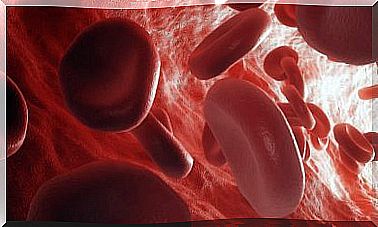Why Do We Have Nightmares?
Although they tend to be more recurrent in childhood and adolescence, day-to-day experiences can also cause us to experience nightmares in adulthood.

The dark side of the human mind has the ability to generate all kinds of nightmares, terrifying delusions that visit us while we sleep.
By definition, a nightmare is ‘a dream that can elicit a significant emotional response, fear or terror’. It can also cause other feelings such as sadness, depression, and anxiety.
We experience nightmares as sources of danger, discomfort and even physical or psychological panic. People who suffer from it usually wake up with an acute feeling of anguish, and without being able to get back to sleep.
If we tend to experience them frequently, with the ability to interfere with sleep patterns and cause insomnia, we may need medical help.
What is the relationship between the REM phase and nightmares?

Nightmares occur during the so-called “rapid eye movement phase, ” or REM phase, which begins towards the end of the sleep cycle.
The stage of life in which they are most frequent is in childhood and adolescence, although almost everyone can have them at some point in their lives. In most cases, these are not serious problems, and they are usually the result of disturbing thoughts throughout the day, such as watching a horror movie.
Nightmares can become a problem if they prevent a person from sleeping properly and can lead to real distress.
What happens when we have nightmares?
In the first phase of dreams, nightmares can occur, although they are lighter and we do not remember them easily. However, in the second phase, in the aforementioned REM phase, dreams are more intense and more elaborate. And for that reason they are more easily remembered.
Brain activity is similar to what we have in waking states, that is, active. The muscles are paralyzed and the rate and respiration may be altered. Although we are not aware of it, the eyes move without stopping.
The perception that we can feel during these dreams produces an agitation that can end in a startled and abrupt awakening.
What nightmares are the most frequent?

Anguish, fear and despair are usually the usual parameters. Among the most common “themes”, we find: the feeling of being persecuted, being late for appointments, insects, reptiles. It is also normal not to be able to move, as well as the feeling of falling into the void.
Why do nightmares occur?
Among the causes of nightmares are physical (one of the best known causes is high fever) or physiological. Among the latter, anxiety, stress and drug ingestion can be determining factors.
Eating immediately before bed increases the body’s metabolism and brain activity, and is a major cause of nightmares.
Psychoanalyst experts assure that nightmares are a manifestation of the unconscious with images that generate anguish. Usually these are unresolved mental conflicts of the person.
Some specialists even assure that the nightmare has the function that the subject can overcome his ancestral fears. Other causes of nightmares can be the intake of alcohol or other types of stimulating drinks, such as coffee or Coca-Cola.
It also influences having spent several nights without sleep, emotional breakdowns, the death of loved ones and even suffering from respiratory disorders during sleep. The latter is known as apnea.
In the case of children, having a nightmare can be a consequence of their insecurity, their fears and accumulated anxiety. But they also arise from illness, violent television programs, and even strong threats from parents.
Are nightmares treatable? Which?

If the nightmares occur repeatedly and distressingly, it is best to consult a specialist. The first thing in the treatment is to rule out that there is any important pathology, such as apneas, or the intake of drugs.
In the next steps, a diagnosis must be made by evaluating the characteristics of the nightmare, at what time of the night it arises, sleeping habits, etc. Polysomnography is also often used to assess the parameters of sleep states and monitor with the help of videos.
How to sleep well?
According to the experts of the World Sleep Society, to sleep well you must try to maintain good sleep hygiene. To do this, they have shared a series of “commandments” or guidelines, which include: eat a light dinner, keep a sleep schedule (go to sleep at the same time every day), avoid caffeine consumption 6 hours before going to school. bed, keep a room with adequate conditions.









